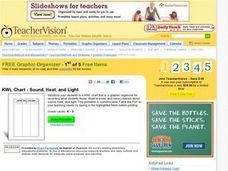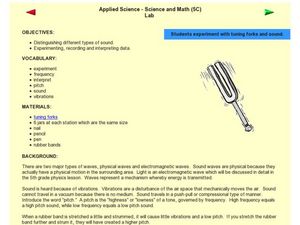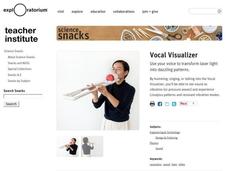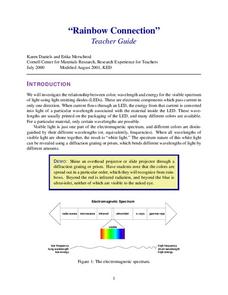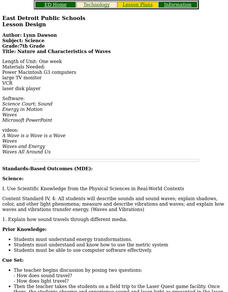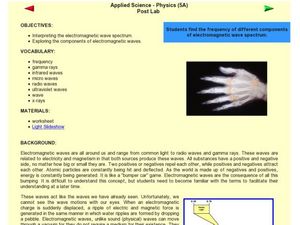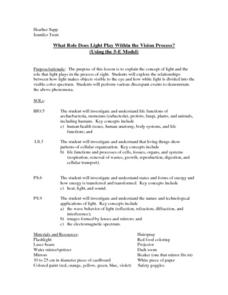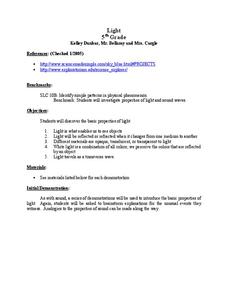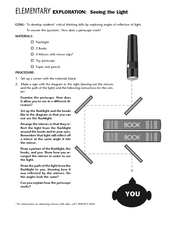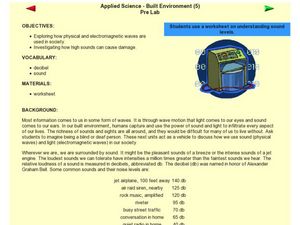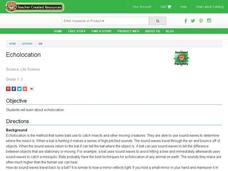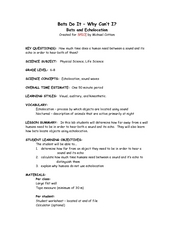Curated OER
Sound, Heat, and Light
In this sound, heat, and light worksheet, students fill in a KWL chart for what they know, what they want to know, and what they learned about sound, heat, and light. Students complete 3 sections in the graphic organizer.
Curated OER
Using Bubbles to Learn about Light Interference
Students explain the wave properties of light.
Curated OER
Sound Observations
Learners explore sound waves by conducting an experiment in class. In this sound frequency lesson, students utilize a tuning fork in class and identify which objects in class create different sound pitches on the fork. Learners conduct...
Curated OER
How the Ear Receives Sound
For this biology worksheet, students identify how the ear receives sound by using the information given to cut and paste each section to complete a flow chart that illustrates this. They lightly color each section of the flow chart to...
Exploratorium
Vocal Visualizer
Make sound visible with an activity that provides directions for how to build a vocal visualizer meant to create light patterns. Making noise into the visualizer causes a mirror to vibrate, reflecting a laser beam, and creating the...
Cornell University
LEDs Rainbow Connection
View LED lights through the eyes of a scientist. Young scholars learn to view light as a wave frequency and connect various frequencies to different colors on the light spectrum. A lab activity asks groups to measure the frequency of...
NASA
Speaking in Phases
Hear from deep space. Pupils learn how satellites transfer information back to Earth. They learn about three different ways to modulate radio waves and how a satellite sends information with only 0s and 1s. Using sound, class members...
Curated OER
Nature and Characteristics of Waves
Seventh graders research different types of waves, identify the parts of a wave and create a Power Point presentation demonstrating what they have learned.
Curated OER
Wave Action
In this waves worksheet, students compare the characteristics of sound and light waves and determine the wavelength, amplitude, and speed of a wave. This worksheet has 9 problems to solve.
Curated OER
From Vibration to Sound
Students observe a series of demonstrations to illustrate wave movement. For this sound wave lesson, students witness how objects create waves when dropped in a dish of water, use a rope and slinky to produce transverse and longitudinal...
Curated OER
Sound Waves
Sixth graders discover how sound is made from vibration and moves in all directions from the source in waves. They see that sound waves can be "seen" if they are translated into light. An excellent experiment is imbedded in this activity.
Curated OER
Electromagnetic Wave Spectrum
Fifth graders examine electromagnetic wave spectrum. In this science lesson, 5th graders discuss the aspects of the electromagnetic wave spectrum and complete a worksheet identifying the parts of the spectrum.
Curated OER
What Role Does Light Play Within the Vision Process?
Learners are introduced to the relationship between light and vision. In groups, they participate in experiments to discover how different wavelengths are divided in the visible spectrum. They record their answers and discuss their...
Curated OER
Light
Fifth graders sit in their seats with the lights on and then the teacher turns off the lights. After their eyes have adjusted, they vote on what colors of construction paper are being held up. The lights are then turned back on and...
Curated OER
Elementary Exploration: Seeing the Light
Students use critical thinking skills to learn about light, sound, and matter. Students follow the procedure steps to complete a light, sound, and matter experiment.
Curated OER
I'm So Bright, I Wear My Shades Indoors
Students observe and draw energy using UV beads. They describe how light can be produced, reflected, refracted, and separated into visible light of various colors.
Curated OER
Applied Science - Built Environment (5) Pre Lab
Fifth graders look at the impact of sound and noise. For this sound lesson, 5th graders review the decibel and common sounds along with their noise levels. They complete a worksheet about the different sounds that one might hear during...
Curated OER
Echolocation
Students explore echolocation. In this bats science lesson, students compare sunlight reflecting off a mirror to sound waves hitting a bat's ears. Students complete a worksheet about bats.
Curated OER
Bats Do It-Why Can't I?
Young scholars explore echos and how they are utilised in navigation. In this sound lesson students calculate the amount of time between a sound and its echo.
Curated OER
Applied Science - Physics (5A) Pre Lab
Fifth graders look at different types of waves. In this wave lesson, 5th graders find the difference and similarities of electromagnetic and physical waves. They review the components of waves such as crest, trough, wavelength, and wave...
Curated OER
Energy Motion in the Ocean
Learners explore the wave energy that is generated and transferred in the ocean. Through the use video and the Internet, students explore the aspects of a wave and how its energy affects the ecology of the seashore.
Curated OER
Now Hear This!
Students create a model of the inner ear. In this hearing lesson, students follow a series of directions to build a working model of the inner ear, then observe how the parts react to a variety of sounds.
Curated OER
Understanding Waves
Young scholars perform 3 hands-on activities to help them explain the terms "crest" and "trough" as related to sound, water, and light waves. All three waves types have troughs and crests. The activities use toys to demonstrate the...
IOP Institute of Physics
Physics in Concert
What do physicists and musicians have in common? A lot more than you might think. After first viewing a slide show presentation and completing a series of skills practice worksheets on the physics of light, sound, and electricity, young...


